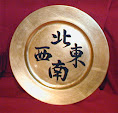I was intrigued (to say the least) when I saw the following announcement by Kyrinn S. Eis of Urutsk and Porphyry fame over at Google+:
“Using RuneQuest Classic, MoonQuest brings an alternate understanding of the canon of Glorantha while retaining its mythic relativism and unique flavour.
MoonQuest is a campaign add-on, a behind the veil look at the amazing and chaotic world so many have loved for decades. While usable as a stand alone setting, the more one knows Glorantha, the more this ... peculiar take will shake the established world view of the reader, and hopefully bring delight and excitement to the players.”
Despite my ugliest threats, Kyrinn wouldn't tell me more about MoonQuest, but I have managed to have her answer a few questions for Timinits & Trolls:
Q: Kyrinn, I have stumbled upon your mysterious announcement on G+... “Using RuneQuest Classic, MoonQuest brings an alternate understanding of the canon of Glorantha while retaining its mythic relativism and unique flavour.”
A: Not really a question, but I suppose you want me to say more about this: I'll end up addressing each of these by answering your questions, but I will remain tight-lipped regarding the specifics, as it is too soon to show my hand; Glorantha was revealed incrementally in play, and tantalisingly few details were provided when the rulebook was released. If MoonQuest is taken on those same merits, it will have to be read in whole when it becomes available.
Q: “MoonQuest is a campaign add-on, a behind the veil look at the amazing and chaotic world so many have loved for decades. While usable as a stand alone setting, the more one knows Glorantha, the more this ... peculiar take will shake the established world view of the reader, and hopefully bring delight and excitement to the players.”
A: MoonQuest will, if I am successful, provide a new scope of adventure while still preserving the majestic sweep of Stafford's canon.
Q: Now, knowing your past work on science fantasy settings such as Urutsk and Porphyry, the first question that has sprung to my mind is: Is this some kind of science fantasy version of Glorantha? with space travel?
A: It is still RuneQuest in the Third Age, and all of the characters and creatures which have been created by Stafford (et al.) still exist as described from the given perspective of the Mortal realm regarding the Mythic powers as described in the RQC book. In later works, more information about the world opens up regarding how Glorantha functions, still (always) described to the PoV of mortals in their realm. The realms beyond the lozenge exist, but mortals cannot understand them without treading the Hero's path towards apotheosis. MoonQuest sheds light on this aspect.
Q: Are you just using Gloranthan tropes to give flavour to a setting out of your imagination, or are you really expanding on our beloved Lozenge, e.g., by adding a whole universe, with planets etc. or are you imaging something in the future of Glorantha (a 5th or 6th age?)
A: Glorantha isn't mine to create a 5th or 6th age. I am simply providing a different way of understanding the official canon; altering the mortal perspective to provide one way of understanding why we see places on a map mortals cannot access, granting an understanding of how both spells and chaos function, etc.
Q: Lastly, since this is an RPG, we all want to know about the ruleset you are going to use, and any modifications you are going to add to it.
A: RQC as just recently re-published via the Kickstarter; the very hardback I received in the mail not but a few weeks ago. As far as modifications: I hope to alter the flow of presentation regarding guilds and prior experience, so that they don't function as afterthoughts in the appendix, in other words, integrating them into standard character generation and training. Any additions will be clearly marked, as per the grey text boxes in the RQC edition. Existing characters and creatures will not be mechanically affected by MoonQuest, but their premise very well may be altered by the light shone upon the setting through this lens.
I think it is important to remind readers that the setting, history, and everything else mean different things to different cultures and each perspective, even while seeming paradoxical, are all equally true from the perspective of their holders: The Lunar Empire are terrible destroyers and subjugators of older cultures, but they are also peace-bringers and civilisers, etc.
MoonQuest is yet another, alternate, understanding to the established canon of the Third Age.
Thank you Kyrinn!
Note— If some of my questions sound completely stupid, it is because I sent all 5 questions before getting any of Kyrinn's answers!









